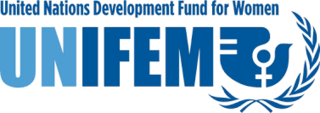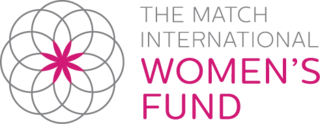
The United Nations Population Fund (UNFPA), formerly the United Nations Fund for Population Activities, is a UN agency aimed at improving reproductive and maternal health worldwide. Its work includes developing national healthcare strategies and protocols, increasing access to birth control, and leading campaigns against child marriage, gender-based violence, obstetric fistula, and female genital mutilation.

The United Nations Development Fund for Women was established in December 1976 originally as the Voluntary Fund for the United Nations Decade for Women in the International Women's Year. Its first director was Margaret C. Snyder. UNIFEM provided financial and technical assistance to innovative programmes and strategies that promoted women's human rights, political participation and economic security. Since 1976 it supported women's empowerment and gender equality through its programme offices and links with women's organizations in the major regions of the world. Its work on gender responsive budgets began in 1996 in Southern Africa and expanded to include East Africa, Southeast Asia, South Asia, Central America and the Andean region. It worked to increase awareness throughout the UN system of gender responsive budgets as a tool to strengthen economic governance in all countries. In 2011, UNIFEM merged with some other smaller entities to become UN Women.

Charlotte Anne Bunch is an American feminist author and organizer in women's rights and human rights movements. Bunch is currently the founding director and senior scholar at the Center for Women's Global Leadership at Rutgers University in New Brunswick, New Jersey. She is also a distinguished professor in the Department of Women's and Gender Studies at Rutgers.

Women of Uganda Network (WOUGNET) also known as Women of Uganda Network Development Limited is Ugandan non-governmental organization that aids women and women's organisations in the use and access of information and communication technologies (ICTs) to share information and address issues their concerns such as gender norms, advocating for their rights and building communities and businesses through education.
Prostitution in El Salvador is not prohibited by national law, but may be prohibited by local municipal ordinances. Municipal ordinances may also prohibit the purchase of sexual services. Related activities such as facilitating, promoting or giving incentives to a person to work as a prostitute (pimping) are illegal. The prostitution of children is also illegal. Brothel ownership, however, is legal. There are no specific laws against human trafficking, but any criminal offence that includes ‘commerce in women or children’ requires sentencing to be increased by 30%.

Women in Kazakhstan are women who live in or are from Kazakhstan. Their position in society has been and is influenced by a variety of factors, including local traditions and customs, decades of Soviet regime, rapid social and economic changes and instability after independence, and new emerging Western values.

The status of women in Argentina has changed significantly following the return of democracy in 1983; and they have attained a relatively high level of equality. In the Global Gender Gap Report prepared by the World Economic Forum in 2009, Argentine women ranked 24th among 134 countries studied in terms of their access to resources and opportunities relative to men. They enjoy comparable levels of education, and somewhat higher school enrollment ratios than their male counterparts. They are well integrated in the nation's cultural and intellectual life, though less so in the nation's economy. Their economic clout in relation to men is higher than in most Latin American countries, however, and numerous Argentine women hold top posts in the Argentine corporate world; among the best known are María Amalia Lacroze de Fortabat, former CEO and majority stakeholder of Loma Negra, the nation's largest cement manufacturer, and Ernestina Herrera de Noble, director of Grupo Clarín, the premier media group in Argentina.
Front Line Defenders, or The International Foundation for the Protection of Human Rights Defenders, is an Irish-based human rights organisation founded in Dublin, Ireland in 2001 to protect those who work non-violently to uphold the human rights of others as outlined in the Universal Declaration of Human Rights.
The ManKind Initiative is a domestic violence charity based in the United Kingdom and is at the forefront of providing support for male victims of domestic abuse and violence. Since becoming a charity in 2001, it has provided a helpline, training and support for statutory agencies and campaigns to ensure that equal recognition is given to male victims in the same way that recognition is given to female victims of domestic abuse. It is one of only a few charities in the country to help male victims.

Violence against women in Guatemala reached severe levels during the long-running Guatemalan Civil War (1960-1996), and the continuing impact of that conflict has contributed to the present high levels of violence against women in that nation. During the armed conflict, rape was used as a weapon of war.

Gender inequality can be found in various areas of Salvadoran life such as employment, health, education, political participation, and family life. Although women in El Salvador enjoy equal protection under the law, they are often at a disadvantage relative to their male counterparts. In the area of politics, women have the same rights as men, but the percentage of women in office compared to men is low. Though much progress has been made since the Salvadoran Civil War ended in 1992, women in El Salvador still face gender inequality.
Frontera Women's Foundation (FWF) is a nonprofit, nonpartisan organization operating in El Paso, Texas, United States, and Ciudad Juárez, Chihuahua, Mexico. Frontera Women's Foundation states its goal is "promoting positive social change for women and girls along the border" and focuses its campaign on community service and issues of women's rights at the family, community, and organizational level. The FWF supports grassroots organizations on the U.S.–Mexico border. The region extends from Southern New Mexico, through El Paso County, Texas, and Ciudad Juárez, Chihuahua, to Brownsville, Texas. The Frontera Women's Foundation supports these organizations by providing grants to groups that support women and girls struggling with issues such as low socio-economic status, gender bias, and ethnic bias.
The International Network of Women's Funds (INWF) is a membership organisation bringing together women's funds from around the world, in order to promote "philanthropy with a feminist perspective". INWF was founded in 2000 with nine members, including the oldest international women's funds Mama Cash and the Global Fund for Women, and in 2014, had 42 members globally. From 2010, the Executive Director has been Emilienne de León.

Ana Irma Rivera Lassén is an Afro-Puerto Rican attorney who is a current Member of the Puerto Rican Senate, elected on November 3, 2020, and who previously served as the head of the Bar Association of Puerto Rico from 2012–2014. She was the first black woman, and third female, to head the organization. She is a feminist and human rights activist, who is also openly lesbian. She has received many awards and honors for her work in the area of women's rights and human rights, including the Capetillo-Roqué Medal from the Puerto Rican Senate, the Martin Luther King/Arturo Alfonso Schomburg Prize, and the Nilita Vientós Gastón Medal. She is a practicing attorney and serves on the faculty of several universities in Puerto Rico; she currently serves on the Advisory Committee on Access to Justice of the Puerto Rican Judicial Branch.
María Suárez Toro is a feminist journalist, an activist in defense of human rights, and an educator. She was born in Puerto Rico and has been a resident of San José, Costa Rica for close to 50 years. She is founder in 2014 of Centro Comunitario de Buceo Embajadoras Del Mar in Costa Rica’s Southern Caribbean. She is founder and director of ESCRIBANA, a feminist digital media venue since 2011. She was a co-director of the Feminist International Radio Endeavor (FIRE) from 1991 to 2011, of which she is a co-founder. She worked as an educator in literacy in many countries in Central America during the 1970s and 1980s. Since 1998 she has been an Associate Professor of Communication at the University of Denver. Since 2011 she has been a correspondent for Haiti, Puerto Rico, and Costa Rica for the News Service for the Women of Latin America and the Caribbean, and since 2015 has been a coordinator of the Community Center Diving Ambassadors of the South Caribbean Sea, which is dedicated to archeological diving and recovery of the history of the afro-descendant population on the coast of Costa Rica.

MATCH International Women's Fund is a non-profit, non-governmental, grant-making organization created to make lasting changes in the lives of women and girls. Their company aims to support projects that dismantle barriers, change systems, challenge perceptions, and transform society and is based in Ottawa, Canada. MATCH is dedicated to funding women's rights movements and grassroots organizations working on women's rights worldwide with a particular interest in the global South. MATCH was founded in 1976 by two Canadian women, Dr. Norma E. Walmsley and Suzanne Johnson-Harvor. Since then, MATCH International has helped womens' rights organizations from numerous countries with investments totaling $12 million for improvement of women and girl's rights. In 2013, the organization re-launched under the name MATCH International Women's Fund with the same aim to invest in women and girls in the global South. As the only international women's fund in Canada, their motto is, "Holding Ground and Breaking Ground" on women's, girls', and transgender rights. The organization's funding comes from individual donors, corporate partners, and the government of Canada.
Foreign aid for gender equality in Jordan includes programs funded by governments or non-governmental organizations (NGOs) that aim to empower women, close gender based gaps in opportunity and experience, and promote equal access to education, economic empowerment, and political representation in the Hashemite Kingdom of Jordan.
When it comes to gender equality in Latin America, Nicaragua ranks high amongst the other countries in the region. When it came to global rankings regarding gender equality, the World Economic Forum ranked Nicaragua at number twelve in 2015, while in 2016 it ranked tenth, and in 2017 the country ranked sixth.

Ana María Falú is an Argentine architect and a social activist for human rights and for women's rights. She has been Regional Director of the United Nations Development Fund for Women for the Andean Region (2002–2004) and for Brazil and the Southern Cone Countries (2004–2009). She is a researcher and Professor at the National University of Córdoba (UNC), where she is the Director of the Housing and Habitat Research Institute (INVIHAB). In the field of feminist action, she promoted numerous institutional initiatives and contributed to the establishment of women's rights to the city, to housing, and to the habitat. She is co-founder of the Women and Habitat Network of Latin America, of the Centro de Intercambio y Servicios para el Cono Sur Argentina (CISCSA), of UNC's Interdisciplinary Program of Women's and Gender Studies (PIEMG), and of Articulación Feminista Marcosur, among other areas of action in favor of women's rights. In 2013 she won the Feminist Career Award together with other Argentine women.

Montserrat Sagot Rodríguez is a Costa Rican sociologist especially known for her work on violence against women and girls. She was a pioneer in research on femicide in Central America. In 2010, she published the first research on femicide in Costa Rica.












